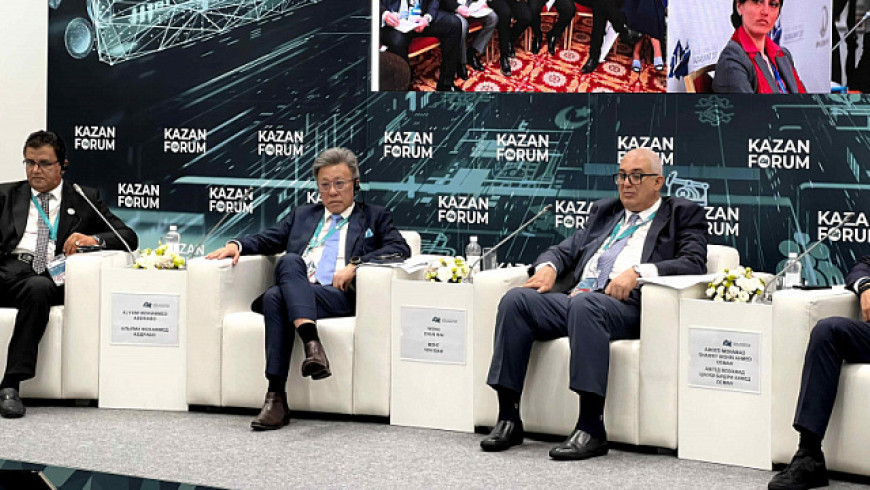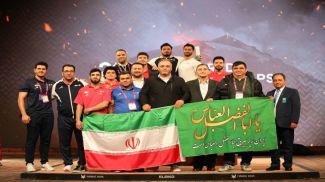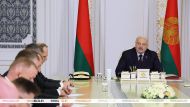
MOSCOW, 16 May (BelTA - TV BRICS) - On the margins of the XVI
International Economic Forum "Russia - Islamic World: KazanForum" the
session "Media of the future in the present: content and technologies"
was held. Representatives of news agencies and media structures
discussed key trends in the development of the sphere, including the use
of digital platforms, artificial intelligence, and transformation of
approaches to working with the audience.
Aidar Salimgaraev, Head of the Republican Agency for Press and Mass Communications Tatmedia, made a welcoming speech and stressed the role of Tatarstan as a centre of dialogue between Russia and the Islamic world in the sphere of media cooperation. He noted that 2025 will mark the 20th anniversary of Russia's accession to the Organisation of Islamic Cooperation (OIC) as an observer.
The session participants paid special attention to the impact of technology on media development. Wong Chun Wai, Chairman of the Malaysian National News Agency BERNAMA, spoke about the experience of using AI in creating news content and visualising historical events.
"The future has already arrived – everyone can now become a content creator. Artificial intelligence is changing everything – from the way we create content to how we consume it. But along with that comes a huge responsibility," he noted.
Amged Mohamad Shawki Bishri Ahmed Osman, Senior Advisor to the Middle East News Agency, a partner of TV BRICS, emphasised the importance of traditional media in the digital age.
"Today, more than ever before, the world needs news agencies that broadcast the truth. We must maintain standards and not give way to unverified information," he said, recounting the experience of the agency, which celebrates its 70th anniversary this year.
Iran was represented at the session by Seyed Musa Kazemi, Editor-in-Chief of IRNA Investigations, a TV BRICS partner. He outlined the challenges facing traditional media in an era of rapid technological transformation, emphasising the importance of analytics and authenticity amid the rapid growth of algorithmic platforms.
"We need to resist the temptation to simply follow trends. The media has a responsibility to fact-check and prioritise accuracy. That is the job of journalists and editors today," Kazemi noted.
Aleksandra Burman, Head of South Asia and Middle East Division of the International Cooperation Department, spoke on behalf of TV BRICS.
She detailed the experience of applying artificial intelligence in multi-lingual media production, including automatic voice translation, subtitling and adapting content to the cultural specifics of a particular audience.
"AI is not a replacement for human talent, but a tool that helps push the boundaries of what is possible and build a global media landscape based on the principles of respect and trust," Burman emphasised.
Among examples, she cited TV BRICS Laboratorium, a special TV BRICS production project with a virtual presenter created by a neural network, and Charm of Mozambique, a programme adapted for viewers from Portuguese to Russian.
"We aim to show the news through the eyes of those who live inside the country. This is the path to true international dialogue," she added.
Participants unanimously noted that the global challenges facing the media sphere – from AI to audience fragmentation – require not only technological solutions, but also new approaches to responsibility, education and international cooperation.
KazanForum takes place in the capital of Tatarstan from 13 to 18 May. It is attended by over 10,000 people from more than 100 countries.
Aidar Salimgaraev, Head of the Republican Agency for Press and Mass Communications Tatmedia, made a welcoming speech and stressed the role of Tatarstan as a centre of dialogue between Russia and the Islamic world in the sphere of media cooperation. He noted that 2025 will mark the 20th anniversary of Russia's accession to the Organisation of Islamic Cooperation (OIC) as an observer.
The session participants paid special attention to the impact of technology on media development. Wong Chun Wai, Chairman of the Malaysian National News Agency BERNAMA, spoke about the experience of using AI in creating news content and visualising historical events.
"The future has already arrived – everyone can now become a content creator. Artificial intelligence is changing everything – from the way we create content to how we consume it. But along with that comes a huge responsibility," he noted.
Amged Mohamad Shawki Bishri Ahmed Osman, Senior Advisor to the Middle East News Agency, a partner of TV BRICS, emphasised the importance of traditional media in the digital age.
"Today, more than ever before, the world needs news agencies that broadcast the truth. We must maintain standards and not give way to unverified information," he said, recounting the experience of the agency, which celebrates its 70th anniversary this year.
Iran was represented at the session by Seyed Musa Kazemi, Editor-in-Chief of IRNA Investigations, a TV BRICS partner. He outlined the challenges facing traditional media in an era of rapid technological transformation, emphasising the importance of analytics and authenticity amid the rapid growth of algorithmic platforms.
"We need to resist the temptation to simply follow trends. The media has a responsibility to fact-check and prioritise accuracy. That is the job of journalists and editors today," Kazemi noted.
Aleksandra Burman, Head of South Asia and Middle East Division of the International Cooperation Department, spoke on behalf of TV BRICS.
She detailed the experience of applying artificial intelligence in multi-lingual media production, including automatic voice translation, subtitling and adapting content to the cultural specifics of a particular audience.
"AI is not a replacement for human talent, but a tool that helps push the boundaries of what is possible and build a global media landscape based on the principles of respect and trust," Burman emphasised.
Among examples, she cited TV BRICS Laboratorium, a special TV BRICS production project with a virtual presenter created by a neural network, and Charm of Mozambique, a programme adapted for viewers from Portuguese to Russian.
"We aim to show the news through the eyes of those who live inside the country. This is the path to true international dialogue," she added.
Participants unanimously noted that the global challenges facing the media sphere – from AI to audience fragmentation – require not only technological solutions, but also new approaches to responsibility, education and international cooperation.
KazanForum takes place in the capital of Tatarstan from 13 to 18 May. It is attended by over 10,000 people from more than 100 countries.













